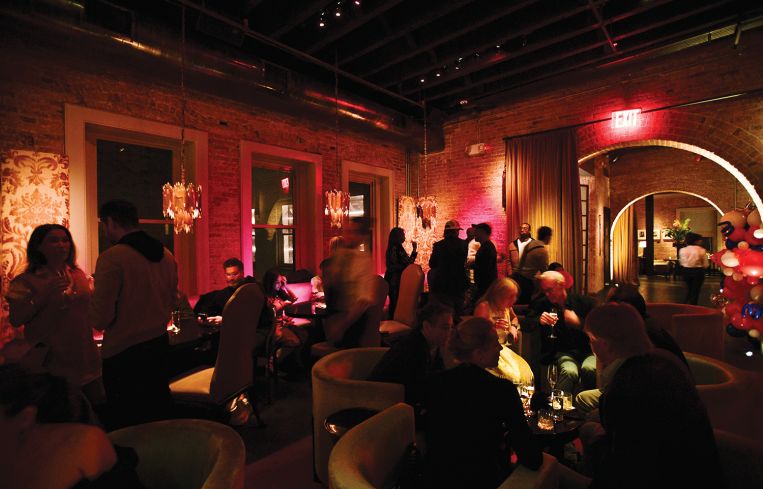NYC’s Fresh Wave of Private Clubs Draws a Younger Clientele Through Food, Wellness
By Larry Getlen February 29, 2024 10:00 am
reprints
While many people have been spurning offices over the past few years, not everyone wants the solitude of home 40 to 50 hours a week. Sometimes, the perfect solution is a middle ground.
Michael Klein is the president and CEO of the government affairs/strategic services firm Urban Strategies. When the world began to emerge from COVID, he shunned the notion of office space for his company, which includes three full-time employees and various part-timers.
Instead, he joined Core Club, the private club at 711 Fifth Avenue that requires initiation fees ranging from $15,000 to $100,000, and then recurring annual fees starting at $10,000 a year. According to Klein, not only have the advantages been plentiful, but the arrangement has saved him money even accounting for the fees.
“I’ve worked in sophisticated government office buildings and a premier Sixth Avenue law firm, and I get more things at Core than from both of those environments,” said Klein. “The logistics at Core are seamless.”
It makes sense. We’re living in an era of clubs. They’re more prevalent now than at any time in the recent past. Some are old and some are new. There have been reports of Mayor Eric Adams feting other mayors at Zero Bond. On a recent chilly Monday evening, the new ZZ’s Club on 12th Avenue was jammed with members vying for tables. As such, clubs have become more integrated into the fabric of city life. It is social life and, indeed, in some cases, work life.
Klein said that unlike in offices the resources he needs to meet with and impress clients are readily available at a moment’s notice — with no reservations or prior arrangements required.
“A typical good day for me at Core is, I’m having coffee in the lounge environment, and then my lunch meeting arrives. I’m only going 40 feet away, but the whole world changes,” said Klein. “Then in the afternoon there’s a serious conference room meeting where everybody’s in suits — because the client is — and that’s also 40 feet away. I don’t find that mix in other places. It’s an amazing amenity because you don’t have to plan ahead. You just have to be present.”
While the pandemic-bred work-from-home trend has remained strong, sometimes the desire to “work from home” is really just an avoidance of the office. For some, private clubs can serve as the perfect middle ground.
“As much as data shows that employees prefer not to come into the office, there’s another psychological side of this that says they like the social interactions that happen at the office, but don’t necessarily want a boss breathing over their shoulder,” said Zack Bates, CEO of development consultancy Private Club Marketing. “A lot of these clubs are industry specific or targeted to a specific demographic, so there’s also networking and connecting with like-minded professionals.”
While private clubs have a long and rich (literally and figuratively) tradition in New York City, they’ve seen a reinvigoration of late. Clubs of old — such as the Harvard Club, the Yale Club, the Penn Club or the J.P. Morgan-founded Metropolitan Club — are fancy places to socialize with people from a common background and in a similar demographic. The new breed, though, are far more hospitality- and activity-oriented, and emphasize a deeper variety of moneyed clientele.
This past November saw the introduction of ZZ’s Club, a private club in Hudson Yards from Major Food Group with a $20,000 initiation fee, $10,000 in annual dues and a significant culinary focus, with several restaurants on premises. The club’s 25,000-square-foot Carbone Privato not only features around 25 dishes developed exclusively for its patrons by Carbone chef Mario Carbone, but the kitchen will make any dish its members desire on 48 hours notice.
“[Some friends and I] did an homage to fast food using Major Food Group-quality ingredients,” said ZZ’s member Shu Chowdhury, founder of the venture capital firm and tech incubator Bowery Engine. “We remade a Filet-O-Fish with Dover sole and caviar tartar sauce. We made a Big Mac using elevated ingredients. We re-created a Mexican pizza from Taco Bell using ZZ’s corn tortillas. It was really fun.”
ZZ’s is just one of the exciting new species of clubs. Casa Cipriani, designed by the legendary architect/designer Thierry Despont, opened in 2021. Aman Club — with a whopping $200,000 initiation fee — and the Soho House-affiliated Ned NoMad premiered in 2022.

NoHo’s Zero Bond opened in 2020, and quickly gained traction for the presence of A-list names that included Kim Kardashian, Pete Davidson, Elon Musk, Leonardo DiCaprio, Tom Brady and Mayor Eric Adams, who uses the club so frequently that he even hosted his election night party there (even though he’s not a member, according to reports).
And, while Core has been operating since 2005, 2023 saw it relocate from 66 East 55th Street to its current, larger space on Fifth Avenue.
“Private clubs have always been part of the New York City landscape. But the more traditional private clubs have given way to a slew of new clubs that have established a new vibe with a modern twist,” said Andrew Rigie, executive director of the New York City Hospitality Alliance, a trade group. “They not only have workspaces, but incredible food and beverage options plus wellness and exercise rooms. There are a lot of foundational similarities, but they’ve evolved into a more modern environment that attracts a younger demographic.”
The demographic shift is but one reason behind the emergence of the next generation of private social clubs.
“I was a member of the Penn Club for years,” said Chowdhury, who, in addition to being a founding member at ZZ’s, also holds memberships at Soho House, Aman Club and The Ned. “I would use it for meetings every now and again over 10 years ago, but I didn’t really get that much use out of it. But there were a lot of older members that really liked it. Like when a friend takes me to the Harvard Club for breakfast, there’s an older generation there that really loves it. It’s part of their routine.”
While many of the clubs actively pursue a younger demographic for membership — Soho House, Core and The Ned NoMad all have discounted rates for younger members — the newer clubs also seek to attract that audience via a very different business philosophy.
Clubs such as those affiliated with the Ivy League became a place to congregate for people with similar class backgrounds and interests. And, while one could certainly enjoy a more than presentable meal there, culinary excellence and cultural curation were rarely the focus.
The new breed of clubs has a different pursuit, often seeking to assemble a broader range of members with more diverse backgrounds and interests, and to present them with an unparalleled hospitality and cultural experience.
Jennie Enterprise, who founded Core in 2005, notes that when evaluating potential members, she and her membership committee look deeper than an applicant’s finances.
“The foundation of our Core world is community, curation and culture,” said Enterprise. “What defines us is the quality of our ideas, and that allows us to curate a community of what we call the relentlessly curious.”
When determining who should be granted membership, Core seeks out “like-minded agents of transformation across 13 different industries,” including media, tech and various branches of the arts.
“That immediately sets us apart, because we’re not looking at a very specific demographic,” said Enterprise. “We’re looking for people who think differently and want to be challenged. We want to be part of their journey of discovery. We think about taking members who are already inherently interested in their own evolution and transformation, and creating conditions for that evolution. It’s the idea that people from all over the world are colliding with people who have different perspectives and come from different industries — equal amounts of men and women, older and younger. That’s the dynamic we try to foster.”
To that end, Core offers a diverse and eclectic array of cultural events, with Enterprise noting that “there’s an extraordinary demand for curated communities and experiences.” Recent programming has included conversations with fashion designer Thom Browne, author Michael Wolff, the editors of the nonprofit news outfit The 19th, and Grammy winner Black Thought in a talk moderated by “Saturday Night Live” Weekend Update co-anchor Michael Che.
In addition to the programming, membership and curation specifics, private clubs in New York City are ever more likely to be one outlet of a larger global brand than simply a prestige stand-alone location. Soho House has locations around the world, including 14 in the U.K. and others throughout Europe, Asia and North America. Core recently opened branches in Milan and San Francisco. Casa Cipriani is also in Milan, and The Ned has clubs in London and Doha.
“A lot of [the success of newer clubs] is the overall brand,” said Rigie. “When you look at many of the newer private clubs, a lot of them have locations around the globe, which attracts the jet-setter type. If you are a very entrepreneurial person, flying around the globe raising money to grow your company, these clubs could be very attractive because you have a home base in all these cities where you’re meeting with investors.”
And, like any successful brand, the success of these clubs comes down to a strong and dependable business model.
“The business model is attractive in terms of the idea that there is an annuity, a membership renewal stream,” said Enterprise. “If you have an engaged community, there’s always the economic interest in a business model that is not purely transactional.”
This is another reason for the success of these clubs, and their appeal to investors.
“What makes private members clubs attractive to, let’s say, capital markets private equity investors is that annuity-type businesses, whether it’s insurance or subscriptions, are attractive because of the recurring revenue model,” said Enterprise. “If you think about food and beverage, you can have a recurring base of dues in addition to your traditional profit margins on the stand-alone business.”
For real estate developer and 711 Fifth Avenue owner Michael Shvo, whose building boasts high-end tenants such as Truist, Loro Piana and Allen & Company, having Core in the building offers both a reliable long-term tenant and, in many cases, an additional amenity.
“We have very high-profile clients in the building,” said Shvo, who is also a partner in Aman Club. “Some of them are already Core members, and some of them have become Core members since they moved in. In essence, it gives the C-suite within these buildings — assuming they apply and get in — access to an extra 60,000 square feet of amenity space. So, if you’re the CEO of Loro Piana and you want to take people for lunch or dinner, or you want do an event, it’s all within your building. The convenience and the access are great. And, it also drives traffic into the building. We did a deal with a Core club member who specifically wanted to be in the building because Core is there.”
Given all this, the future of private clubs in New York looks poised to remain strong.
“I think it’s going to continue to be an evolution of what we’re seeing,” said Rigie. “Really interesting, beautiful spaces with great food, great hospitality, and the right people in the room.”



